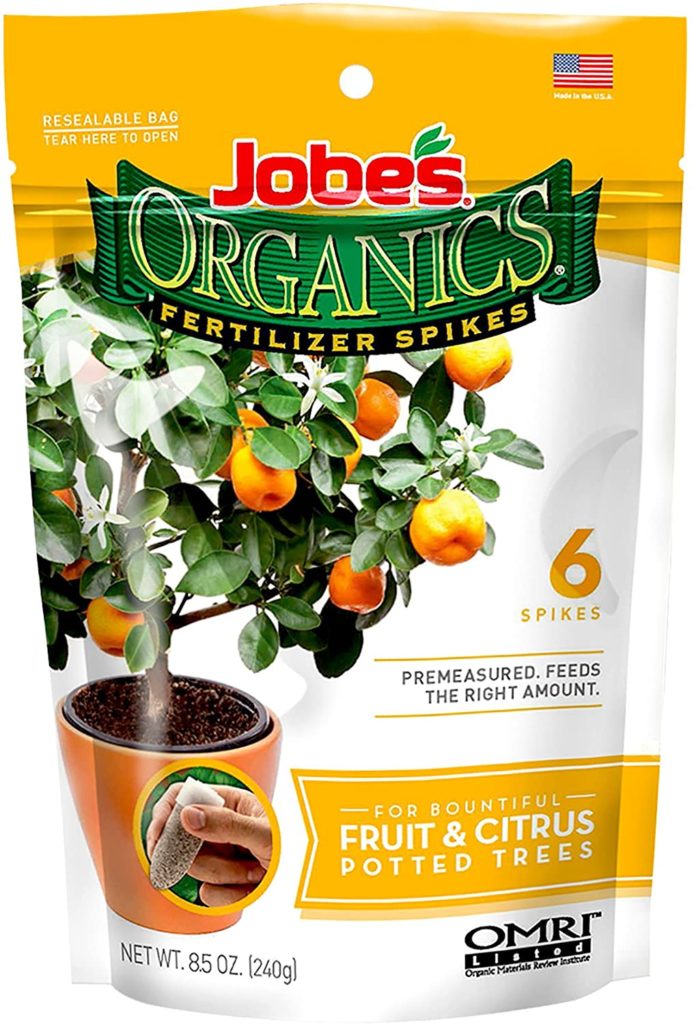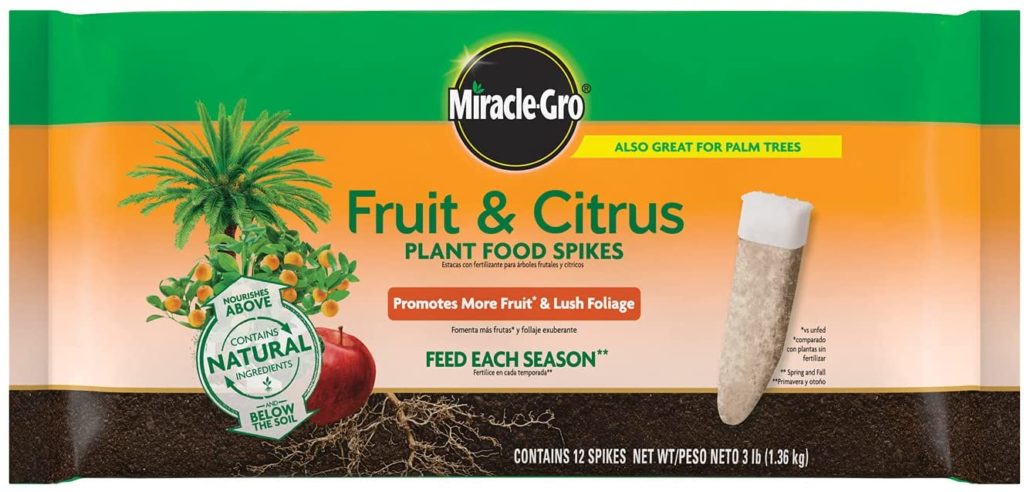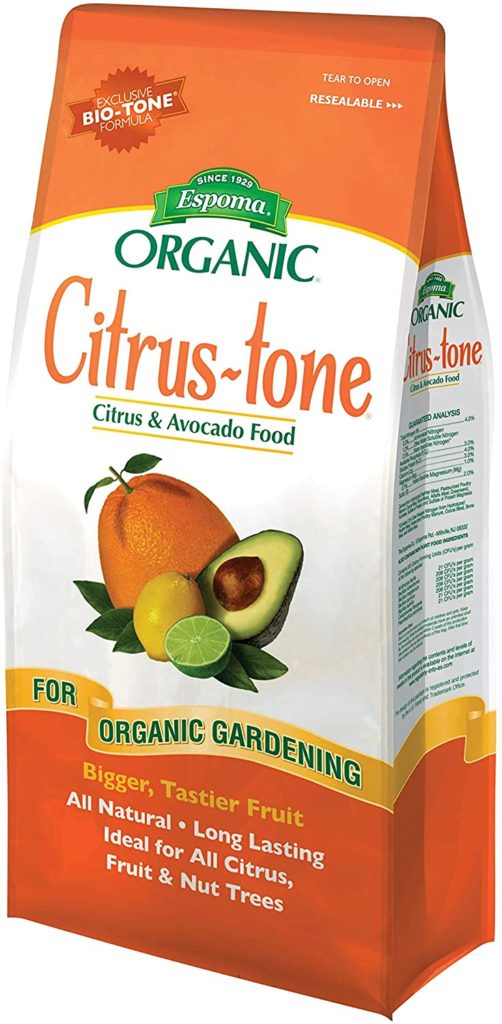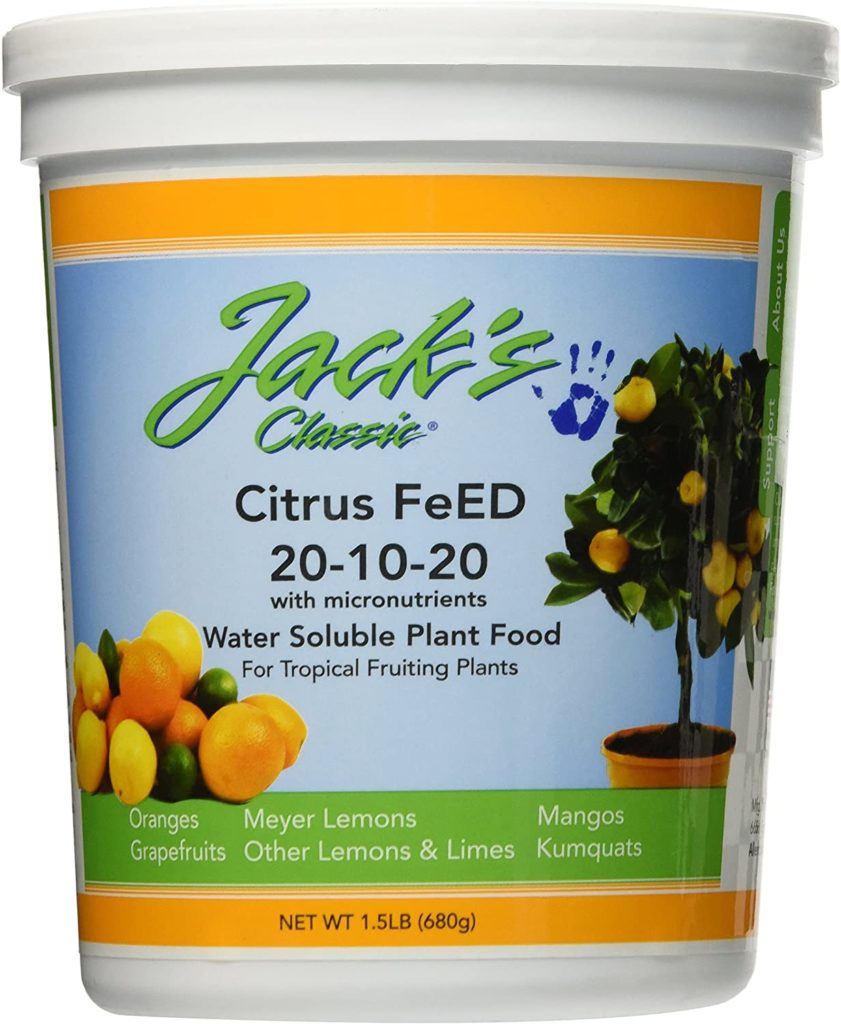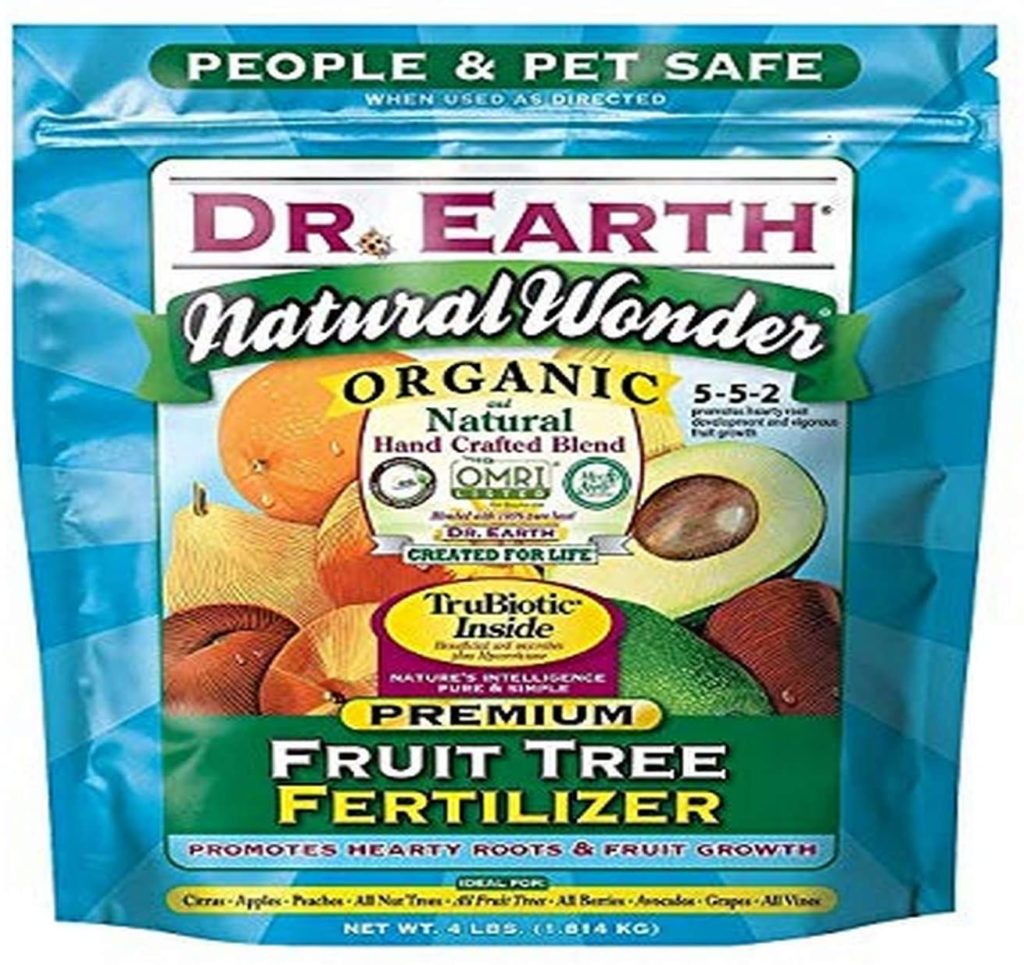Orange trees are a great addition to any yard, especially if your home is in an area that receives plenty of sunlight. Depending on where you live, they can be grown either indoors or outdoors, and both will produce fruit provided they are properly cared for and maintained.
Fertilizer is essential to care for and maintain your orange tree if you do not live in a tropical climate. If you are planting an orange tree in the ground or in a pot, you must apply the right fertilizer to ensure that your tree grows well.
Citrus fertilizer with a higher nitrogen content is required for trees planted in containers. However, balanced 10-10-10 or 12-6-5 fertilizers are required for trees growing outdoors.
Chemical-based and organic citrus fertilizer mixtures are available in a range of forms, including spikes, sprays, and granules. These fertilizers can be applied in various methods, including spikes, sprays, and granules.
Best Orange Fertilizers to Buy
The quality of the fruit produced by your tree is closely related to the fertilizer you use. More potassium in your fertilizer will make your oranges taste better, while nitrogen helps to reinforce the peel and protect the flesh of the fruit when you apply it.
If you use a low-cost fertilizer, you run the risk of your oranges getting mushy due to excessive nitrogen in the soil. A poor-quality fertilizer may also cause damage or death to your plant.
It is necessary to fertilize citrus trees with a 6-6-6 N-P-K fertilizer that contains micronutrients such as iron, copper, manganese, boron, zinc, and other macronutrients.
Choose a product specifically formulated for citrus trees to ensure that the plants can absorb the nutrients from the soil and grow successfully. An overview of the most significant nutrients for the health of an orange tree can be found in the following section.
1. Jobe’s Organics Fruit & Citrus Fertilizer Spikes
Jobes Organics Fruit & Citrus Plant Food is approved for organic use by the Organic Materials Review Institute (OMRI) because it contains all-natural components such as feather meal, bone meal, processed poultry manure, and sulfate of potash. So the sum of all of these molecules yields N (3 percent), P (5 percent), K (5 percent), Ca (8 percent), Mg (0.5 percent), and S. N (3 percent), P (5 percent), K (5 percent), Ca (8 percent), Mg (0.5 percent), S (1 percent).
Its NPK ratio is 3-5-5. With the use of this plant meal, which contains 1.2 percent soluble and 1.8 percent insoluble nutrients, it is possible to achieve both immediate and long-term nitrogen feeding. Given the abundance of orange trees in N, it is a beautiful arrangement to have.
While Ca, on the other hand, might have drawn your attention because of its high concentration, Calcite (Ca) is the most abundant mineral by weight in an orange tree, and citrus trees such as oranges require a lot of calcium for structural and physiological growth.
The introduction of Jobes BIOZOME is probably the best feature. Included in the mix are microorganisms like bacteria, mycorrhizal fungus, and archaea, which improve the soil quality of your garden and make it a good host for citrus trees such as orange and lemon, avocado, and almonds.
Features:
- The formula is 3-5-5-5.
- Six spikes in a package
- Use in spring and fall.
- Good for Citrus plants and other fruit trees
Direction For Usage:
Insert the spike into the ground along the tree’s drip line, and you’re finished. To feed your 3-inch-wide tree, you’ll need 4-5 spikes. The product comes with simple and straightforward instructions printed on the packaging. In the sample, 8 spikes were available in a single pack, or 15 spikes were available in 15-packs.
Pros and Cons:
- Convenient storage
- Citrus trees in pots perform best
- OMRI-listed
- Environment-friendly
- No harm to children or pets
- Contains BIOzome to improve soil health
- It’s simple to use and doesn’t require any mixing
- In re-sealable containers
- Consistent nutrient release without runoff or fertilizer burning
- An organic odor
- The odor can attract pests to your yard
2. Miracle-Gro Fruit & Citrus Plant Food Spikes
In order to create Miracle-Gro Fruit & Citrus Plant Food, a combination of organic and chemical substances such as ammonium sulfate, ammonium phosphate, feather meal, bone meal, magnetic rock, manganese sulfate, and more are combined. Because it is a semi-organic fertilizer, it meets the requirements.
In addition to fundamental nutrients, this fertilizer allegedly contains secondary nutrients (including 15 percent phosphorus and 15 percent potassium) as well as micronutrients (including 8 percent sulfur) (0.1 percent Fe & 0.05 percent Mn). In addition, several other nutrients, such as calcium, magnesium, and sodium, have been included in the list.
You are already aware that orange trees require a greater amount of P, N, and K than other plants. Nonetheless, the NPK ratio of the fertilizer, which is 10-15-15, is not particularly appealing. It indicates that the fertilizer contains 10 percent nitrogen, 15 percent phosphorus, and 15 percent potassium. In addition, 0.2 percent water-insoluble nitrogen is beneficial when it allows for a prolonged time of feeding.
Consequently, a slight decrease in the amount of N will have no effect so long as P and K are operational. Aside from that, by incorporating 9.8 percent ammonia Cal nitrogen into the soil, the fertilizer helps to elevate the pH of the soil just enough to support the growth of orange trees in the area.
On the other hand, sulfur at an 8 percent concentration has the same effect. As a result, customers should expect an increase in the amount of fruit produced by the company. It is fairly noticeable due to the high concentration of nutrients in it.
As a result of its spike-like shape, it is the best fertilizer for orange trees planted in containers and is, therefore, the most widely used.
There is no need for this type of pre-application math with spike fertilizer because it ensures that there will be no leaching away. A plus is that the fertilizer is composed of natural components such as bone meal, feather meal, and magnetic rock, which contribute to its effectiveness.
Features:
- Spikes in fertilizer
- The ratio of NPK: 10-15-15
- 12 spikes
Direction for use:
Start by tracing a dripline and taking an in-ground orange tree’s diameter measurement. Next, place one spike every 4 feet along the dripline, but make sure the soil is soft or slightly wet before doing so. Spikes should be applied to the plants twice a year, once in the spring and once in the fall.
Pros and Cons:
- For continued feeding, apply only twice a year
- Natural compounds to promote citrus tree health and fruiting
- Direct nutrient delivery to tree roots
- Excellent for citrus trees in both the ground and containers
- When hammered too hard, spikes might break apart
- More expensive than granules or liquid
- It is too powerful for young trees
3. Espoma CT4 Citrus-tone Plant Food
Espoma CT4 Citrus-tone Food comes in a four-pound box and is available for purchase. Also available in two-, three-, and four-pack configurations. This product has been developed to fulfill the dreams of organic gardeners around. There are no preservatives in this product that might be harmful to the citrus plant. It is home to thousands of microorganisms, all of which contribute to the health of the plant.
It can be applied to any type of citrus, nut, or fruit tree, including almonds. As an added bonus, you will get a long period of feeding time. It ensures that your plants are well-nourished and well-balanced, which is important.
The ingredient helps in the growth and development of the entire tree’s root system and top. When the fruit is harvested, it will be tastier and greater in size than it is at this point in the season.
It’s available in a 5-2-6 formulation as well. You may need to feed your tree more frequently in order to achieve the greatest outcomes. Depending on the situation, the fertilizer can be used indoors and out. No matter what type you choose, the odor is overwhelming. Houseplants are not an appropriate setting for this type of activity.
Remember that there are certain requirements for using this product with trees outside, so keep that in mind. Plants grown indoors should not be fertilized in the same manner as their outdoor counterparts since this would result in over-fertilization of the plants. Instead of using a full cup of fertilizer, use a quarter cup of the same amount of fertilizer.
Direction for Usage:
It is recommended that pre-bloom applications be filed in January, with post-bloom applications being submitted in May or June. Then, an additional application in the fall or spring can be made to ensure that all of the nutrients required for winter are provided. For potted Orange plants, evenly distribute 3 tablespoons of the mixture over the soil in a 12-inch container. Afterward, scrape the soil a little and soak it all in.
Pros and Cons:
- Organic citrus fertilizer that enhances fruit size and flavor
- A single application might last for up to two years
- A slow-release granular formulation
- Beneficial microorganisms to promote tree soil health
- Produces fruits and blooms in a short period of time
- Organic odor.
- Ineffective against a fungal attack like some other items
4. J R Peters Inc Jack’s Classic Citrus Food
The nutrient profile of Jack’s Classic Citrus Feed for Citrus plants is well-documented for citrus plants. The optimal combination of ecologically friendly inorganic ingredients is found in this fertilizer, which is suitable even for organic growers. Along with urea, potassium sulfate, iron EDTA, and manganese EDTA are all potential sources of the compound.
This diet contains 11 essential minerals, including 20 percent nitrogen, 10 percent phosphorus, 20 percent potassium, 1 percent magnesium, 4.9 percent sulfur, 0.02 percent boron, 0.05 percent copper, 0.05 percent manganese, 0.05 percent molybdenum, and 0.05 percent zinc. Due to the fact that all of the nutrients in the fertilizer are water-soluble, it begins working right away.
The plants benefit from this since it provides an immediate supply of food. The 20-10-20 NPK ratio appears to be more beneficial for mature orange trees than it appears to be for seedlings (20-10-20).
It’s interesting to note that the nitrogen in the fertilizer comes from three separate sources, ensuring that the orange trees get all of the nitrogen they require and will never run out of nitrogen.
It also provides the orange trees with five key micronutrients that they require. This fertilizer is beneficial to citrus and tropical fruiting plants such as Grapefruits, Meyer Lemons, Lime, Mango, Kumquat, and other tropical fruiting plants.
Copper, iron, manganese, and zinc are all present in a chelated form in the fertilizer, whereas other elements are not. They are organic chemicals that prevent these nutrients from becoming involved in any potentially detrimental soil reactions while ensuring that they are available to the root zone for continuous uptake. This is the best water-soluble fertilizer for your Orange plants on the market.
Features:
- NPK formation: 20-20-20
- Granular
- Synthetic
Direction for Use:
Each week to ten days, you should apply 1 tablespoon of fertilizer diluted with a gallon of water to your lawn. It can be applied as a soil drench or as a foliar spray, which is a new application.
Pros and Cons:
- Great for trees outside
- Suitable for citrus and oranges
- Increased potassium content ensures juicy fruit
- An excellent source of additional nutrients when compared to other fertilizers
- Its higher NPK ratio helps nutrient-deficient citrus trees recover and thrive
- Faster absorption due to its water-soluble composition
- A re-sealable container No strong organic odor
- This is a powerful formula
- Fertilizer made from synthetic materials
5. Dr. Earth Citrus & Fruit Fertilizer
When your organic fertilizer contains ingredients such as feather meal, fishbone meal, bone meal, alfalfa meal, potassium sulfate, and kelp flour and meal, there is a strong likelihood that it will be certified for use by the OMRI, CDFA, and the NOP. In this case, it was the same thing that happened to the fertilizer.
If you combine these three different sources, your soil will gain 10% more N, 10% P, and 2%K, resulting in a bumper crop of oranges. Several macro-and micronutrients are necessary for the growth of orange trees, none of which have been specified by the manufacturer. The fertilizer has a 5 percent concentration and is fully insoluble in water in terms of nitrogen content. As a result, this product can provide nutrition to your Orange trees for up to three months.
You may have noticed the greater P content due to the increased P content. During the first two years of their lives, orange trees require approximately the same quantity of P as they do N. As a result, it is extremely effective as a fertilizer for Orange seedlings. In addition, it is safe to apply to oranges, avocados, berries, grapes, and other types of fruit plants, and it is non-toxic to humans and dogs.
Secondly, it contains what is known as TruBiotic, a combination of colony-forming bacteria and fungus, as well as organic and natural sources. This particular combination provides care for the soil and transforms it into an optimal environment for the growth of Orange trees. At a concentration of 9 percent, Humic acid can be used to create soil that is organically rich, well-drained, and very productive. Because of environmental and genetic concerns, there are no genetically modified organisms present in the fertilizer formulation.
Features:
- NPK Formulation: 7-4-2
- Multipacks of 25 lbs
- It’s best to use it twice a year, in March and October
- This product is safe for citrus and fruit trees as well as potted plants and vines. It is also good for avocados and persimmons
When your organic fertilizer contains ingredients such as feather meal, fishbone meal, bone meal, alfalfa meal, potassium sulfate, and kelp flour and meal, there is a strong likelihood that it will be certified for use by the OMRI, CDFA, and the NOP. In this case, it was the same thing that happened to the fertilizer.
If you combine these three different sources, your soil will gain 10% more N, 10% P, and 2%K, resulting in a bumper crop of oranges. Several macro-and micronutrients are necessary for the growth of orange trees, none of which have been specified by the manufacturer. The fertilizer has a 5 percent concentration and is fully insoluble in water in terms of nitrogen content. As a result, this product can provide nutrition to your Orange trees for up to three months.
You may have noticed the greater P content due to the increased P content. During the first two years of their lives, orange trees require approximately the same quantity of P as they do N. As a result, it is extremely effective as a fertilizer for Orange seedlings. In addition, it is safe to apply to oranges, avocados, berries, grapes, and other types of fruit plants, and it is non-toxic to humans and dogs.
Secondly, it contains what is known as TruBiotic, a combination of colony-forming bacteria and fungus, as well as organic and natural sources. This particular combination provides care for the soil and transforms it into an optimal environment for the growth of Orange trees. At a concentration of 9 percent, Humic acid can be used to create soil that is organically rich, well-drained, and very productive. Because of environmental and genetic concerns, there are no genetically modified organisms present in the fertilizer formulation.
- Organic certification
- Pet-and-kid-friendly
- Boosts the plant’s general health and growth
- OMRI-listed
- Environment-friendly
- Premium organic components are used in this product
- Can develop excessive foliage
- Has a strong organic smell
Frequently Asked Questions (FAQs)
Let’s dive in more with these frequently asked questions.
It is advised that citrus trees be fertilized twice a year, in August and February, to ensure optimum growth. A good suggestion is to alternate fertilizers, such as Dynamic Lifter in August/September and Complete Citrus Food in February.
Maintain adequate hydration for citrus trees during the spring and early summer, when new fruit is developing.
The presence of yellow leaves or chlorosis on citrus trees is widespread, and it can be caused by overwatering or a lack of nutrients. Citrus plants require frequent watering throughout the hotter months of the year.
While overwatering may cause root rot, underwatering can cause the soil to become depleted of nutrients. Withering leaves are a common symptom of trees that have been overwatered.
When working with a range of products, it is important to carefully read the instructions on the container.
Liquid fertilizers are typically sprayed on the tree’s foliage or poured beneath the tree, while granular fertilizers can be scattered and mixed into the soil. Potted plants and trees in the ground benefit from adding fertilizer spikes to their soils.
Most citrus trees benefit from all-purpose citrus fertilizer, which is available in a variety of strengths.
Despite the fact that the soil’s nutrient profile may demand a higher concentration of one nutrient than another, fertilizer may still be required. The most effective methods are soil testing and the purchase of fertilizer to fill in the gaps.
Conclusion
It is impossible to stress the importance of fertilizing citrus trees. If you do not give adequate care to your citrus tree, it may develop diseased or yield less fruit than it should. You should understand the value of utilizing high-quality citrus tree fertilizer.
If you don’t utilize it, your trees may become sick or develop yellowed leaves. There is a possibility that it will not be able to produce as much fruit as it could have in the first place.
It is important to use fertilizer on your trees if you want them to appear better, have greener leaves, and bear more fruit.
You will be happy with the results if you put in a little effort and fertilizer. It’s also important to make certain you’re buying the right things. Using pre-measured organic fertilizers for your citrus tree eliminates the need to worry about over-or under-fertilizing your tree, making them much more convenient.

